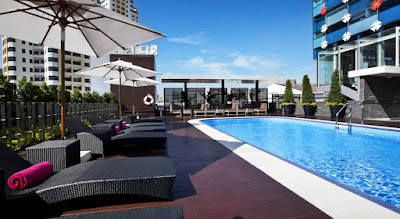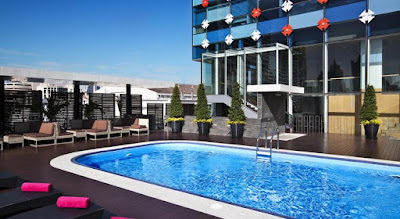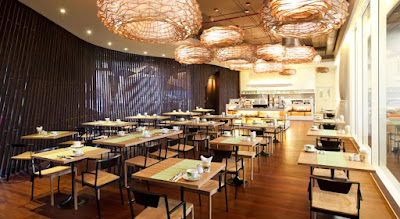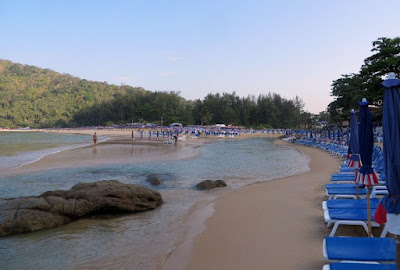Considering all the prevailing negative stereotypes about Thailand and Thai people, it is understandable why the Thai government would want to promote a greater understanding about Thainess. But Thainess is nothing new.
Classical Thai dancers, golden-spired temples, floating markets – such Utopian images of Thailand have been greatly exploited in tourism promo campaigns since the 1970s and 1980s, widely portrayed in “Visit Thailand” posters pinned up at tour offices and Thai restaurants around the world.
Those initial impressions we drew from such imagery may still have a place in many of our hearts; at first sight, we were immediately drawn in, awed and intrigued by such cultural color ...
While these iconic elements are indeed uniquely Thai and have been so for centuries, they don’t accurately reflect or portray the identity of modern Thailand and the majority of its people.
Much is the disappointment for many to learn that such images are far from the reality, that the Thai people of the present day, for better or worse, have long-evolved, and made numerous self-preserving identity-sacrifices over the decades and centuries in keeping up with reform and modernization.
Most Thai people today have never even been on an elephant, let alone sat on a wooden canal boat – certainly not for commuting.
Indeed, floating markets and elephant camps are little more than fading tourist attractions to meet the expectations of those still seeking to fulfil expectations of that glorious, idealistic image of century-old Siam.
Many luxury hotels will continue to market and exploit this expectation. And it is at/through such properties where you still may be able to see a classical Thai dance/music performance, or book a trip to the nearest floating market, or to the jungle for an elephant ride.
But beyond the hotel lobby’s tour desk, you’ll eventually have to emerge from that proverbial cave of allegory, coming to the realisation that the majority of the khlongs have long been abandoned or filled in with concrete.
Modern Thai people spend thousands of hours a year in traffic jams, if not on the back of a recklessly speeding motorbike, or squeezed shoulder-to-shoulder in overcrowded public transport ... But such “modernisation” challenges are not unique to Thailand, and ubiquitous across the developing world.
As for embracing “Thainess” in a modern context, we must look below the surface, where there lies a certain prevailing charm and lure; it is just as much about the outlook and hospital nature of the Thai people – that smile that says “I’m curious about you...” – that friendly, optimistic spirit which can be found in abundance across the kingdom. full of millions who will happily welcome complete strangers into their family homes, and feed them into a coma.
An empathetic and intuitive people who you can depend on to lend a hand if it is within their means, and they’ll likely not ask for anything in return.
Sure, there are plenty of exceptions to the Thai people's good-willed nature, but let us not forget that deceit and greed are universal wherever there is ignorance and economic disparity.
So let us try hard not to feed such negative pessimism, and instead embrace the longevity-enabling optimistic outlook for which Thainess is foremost and firmly rooted. Mai Pen Rai na, Yaa Kit Maak ไม่เป็นไรนะ อย่าคิดมาก – It’s alright na, don’t stress it!
Adapted with permission from original article on www.siamerican.com
Classical Thai dancers, golden-spired temples, floating markets – such Utopian images of Thailand have been greatly exploited in tourism promo campaigns since the 1970s and 1980s, widely portrayed in “Visit Thailand” posters pinned up at tour offices and Thai restaurants around the world.
Those initial impressions we drew from such imagery may still have a place in many of our hearts; at first sight, we were immediately drawn in, awed and intrigued by such cultural color ...
While these iconic elements are indeed uniquely Thai and have been so for centuries, they don’t accurately reflect or portray the identity of modern Thailand and the majority of its people.
Much is the disappointment for many to learn that such images are far from the reality, that the Thai people of the present day, for better or worse, have long-evolved, and made numerous self-preserving identity-sacrifices over the decades and centuries in keeping up with reform and modernization.
Most Thai people today have never even been on an elephant, let alone sat on a wooden canal boat – certainly not for commuting.
Indeed, floating markets and elephant camps are little more than fading tourist attractions to meet the expectations of those still seeking to fulfil expectations of that glorious, idealistic image of century-old Siam.
Many luxury hotels will continue to market and exploit this expectation. And it is at/through such properties where you still may be able to see a classical Thai dance/music performance, or book a trip to the nearest floating market, or to the jungle for an elephant ride.
But beyond the hotel lobby’s tour desk, you’ll eventually have to emerge from that proverbial cave of allegory, coming to the realisation that the majority of the khlongs have long been abandoned or filled in with concrete.
Modern Thai people spend thousands of hours a year in traffic jams, if not on the back of a recklessly speeding motorbike, or squeezed shoulder-to-shoulder in overcrowded public transport ... But such “modernisation” challenges are not unique to Thailand, and ubiquitous across the developing world.
As for embracing “Thainess” in a modern context, we must look below the surface, where there lies a certain prevailing charm and lure; it is just as much about the outlook and hospital nature of the Thai people – that smile that says “I’m curious about you...” – that friendly, optimistic spirit which can be found in abundance across the kingdom. full of millions who will happily welcome complete strangers into their family homes, and feed them into a coma.
An empathetic and intuitive people who you can depend on to lend a hand if it is within their means, and they’ll likely not ask for anything in return.
Sure, there are plenty of exceptions to the Thai people's good-willed nature, but let us not forget that deceit and greed are universal wherever there is ignorance and economic disparity.
So let us try hard not to feed such negative pessimism, and instead embrace the longevity-enabling optimistic outlook for which Thainess is foremost and firmly rooted. Mai Pen Rai na, Yaa Kit Maak ไม่เป็นไรนะ อย่าคิดมาก – It’s alright na, don’t stress it!
Adapted with permission from original article on www.siamerican.com
.
Considering all the prevailing negative stereotypes about Thailand and Thai people, it is understandable why the Thai government would want to promote a greater understanding about Thainess. But Thainess is nothing new.
Classical Thai dancers, golden-spired temples, floating markets – such Utopian images of Thailand have been greatly exploited in tourism promo campaigns since the 1970s and 1980s, widely portrayed in “Visit Thailand” posters pinned up at tour offices and Thai restaurants around the world.
Those initial impressions we drew from such imagery may still have a place in many of our hearts; at first sight, we were immediately drawn in, awed and intrigued by such cultural colour ...
While these iconic elements are indeed uniquely Thai and have been so for centuries, they don’t accurately reflect or portray the identity of modern Thailand and the majority of its people.
Much is the disappointment for many to learn that such images are far from the reality, that the Thai people of the present day, for better or worse, have long-evolved, and made numerous self-preserving identity-sacrifices over the decades and centuries in keeping up with reform and modernisation.
Most Thai people today have never even been on an elephant, let alone sat on a wooden canal boat – certainly not for commuting.
Indeed, floating markets and elephant camps are little more than fading tourist attractions to meet the expectations of those still seeking to fulfil expectations of that glorious, idealistic image of century-old Siam.
Many luxury hotels will continue to market and exploit this expectation. And it is at/through such properties where you still may be able to see a classical Thai dance/music performance, or book a trip to the nearest floating market, or to the jungle for an elephant ride.
But beyond the hotel lobby’s tour desk, you’ll eventually have to emerge from that proverbial cave of allegory, coming to the realisation that the majority of the khlongs have long been abandoned or filled in with concrete.
Modern Thai people spend thousands of hours a year in traffic jams, if not on the back of a recklessly speeding motorbike, or squeezed shoulder-to-shoulder in overcrowded public transport ... But such “modernisation” challenges are not unique to Thailand, and ubiquitous across the developing world.
As for embracing “Thainess” in a modern context, we must look below the surface, where there lies a certain prevailing charm and lure; it is just as much about the outlook and hospital nature of the Thai people – that smile that says “I’m curious about you...” – that friendly, optimistic spirit which can be found in abundance across the kingdom. full of millions who will happily welcome complete strangers into their family homes, and feed them into a coma.
An empathetic and intuitive people who you can depend on to lend a hand if it is within their means, and they’ll likely not ask for anything in return.
Sure, there are plenty of exceptions to the Thai people's good-willed nature, but let us not forget that deceit and greed are universal wherever there is ignorance and economic disparity.
So let us try hard not to feed such negative pessimism, and instead embrace the longevity-enabling optimistic outlook for which Thainess is foremost and firmly rooted. Mai Pen Rai na, Yaa Kit Maak ไม่เป็นไรนะ อย่าคิดมาก – It’s alright na, don’t stress it!
Adapted with permission from original article on www.siamerican.com
- See more at: http://www.thephuketnews.com/culture-thainess-in-the-21st-century-53852.php#sthash.fzq3Gsto.dpuf
Classical Thai dancers, golden-spired temples, floating markets – such Utopian images of Thailand have been greatly exploited in tourism promo campaigns since the 1970s and 1980s, widely portrayed in “Visit Thailand” posters pinned up at tour offices and Thai restaurants around the world.
Those initial impressions we drew from such imagery may still have a place in many of our hearts; at first sight, we were immediately drawn in, awed and intrigued by such cultural colour ...
While these iconic elements are indeed uniquely Thai and have been so for centuries, they don’t accurately reflect or portray the identity of modern Thailand and the majority of its people.
Much is the disappointment for many to learn that such images are far from the reality, that the Thai people of the present day, for better or worse, have long-evolved, and made numerous self-preserving identity-sacrifices over the decades and centuries in keeping up with reform and modernisation.
Most Thai people today have never even been on an elephant, let alone sat on a wooden canal boat – certainly not for commuting.
Indeed, floating markets and elephant camps are little more than fading tourist attractions to meet the expectations of those still seeking to fulfil expectations of that glorious, idealistic image of century-old Siam.
Many luxury hotels will continue to market and exploit this expectation. And it is at/through such properties where you still may be able to see a classical Thai dance/music performance, or book a trip to the nearest floating market, or to the jungle for an elephant ride.
But beyond the hotel lobby’s tour desk, you’ll eventually have to emerge from that proverbial cave of allegory, coming to the realisation that the majority of the khlongs have long been abandoned or filled in with concrete.
Modern Thai people spend thousands of hours a year in traffic jams, if not on the back of a recklessly speeding motorbike, or squeezed shoulder-to-shoulder in overcrowded public transport ... But such “modernisation” challenges are not unique to Thailand, and ubiquitous across the developing world.
As for embracing “Thainess” in a modern context, we must look below the surface, where there lies a certain prevailing charm and lure; it is just as much about the outlook and hospital nature of the Thai people – that smile that says “I’m curious about you...” – that friendly, optimistic spirit which can be found in abundance across the kingdom. full of millions who will happily welcome complete strangers into their family homes, and feed them into a coma.
An empathetic and intuitive people who you can depend on to lend a hand if it is within their means, and they’ll likely not ask for anything in return.
Sure, there are plenty of exceptions to the Thai people's good-willed nature, but let us not forget that deceit and greed are universal wherever there is ignorance and economic disparity.
So let us try hard not to feed such negative pessimism, and instead embrace the longevity-enabling optimistic outlook for which Thainess is foremost and firmly rooted. Mai Pen Rai na, Yaa Kit Maak ไม่เป็นไรนะ อย่าคิดมาก – It’s alright na, don’t stress it!
Adapted with permission from original article on www.siamerican.com
- See more at: http://www.thephuketnews.com/culture-thainess-in-the-21st-century-53852.php#sthash.fzq3Gsto.dpuf
.







